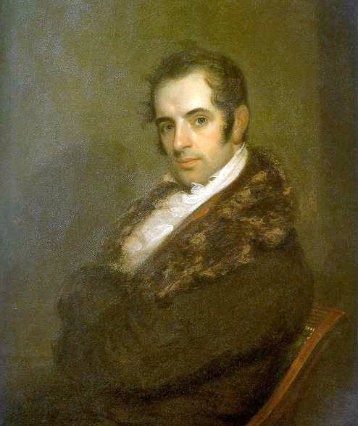Introduction
Washington Irving (1783–1859) was an American author and US ambassador to Spain, perhaps best known for his short stories “Rip Van Winkle” and “The Legend of Sleepy Hollow” and for his five-volume biography of his namesake, George Washington. One of the first American writers to garner acclaim in Europe, Irving wrote his history of Christopher Columbus while accompanying the American diplomat Alexander Hill Everett in Madrid, making good use of the consul’s library on Spanish history. Published as a four-volume set in 1828, the semi-fictional account quickly became immensely popular.
Try to imagine yourself both as Columbus and as one of Columbus’ crew, first sighting land and coming ashore after the long and tumultuous voyage. How well do you think Irving captures your feelings and thoughts? Now imagine yourself as one of the natives on the island. How would you regard the sea-faring Europeans? What, exactly, is being celebrated in Irving’s account of the landing? Is the account believable?
It was on the morning of Friday, 12th October, 1492, that Columbus first beheld the new world. When the day dawned, he saw before him a level and beautiful island several leagues in extent, of great freshness and verdure, and covered with trees like a continual orchard. Though every thing appeared in the wild luxuriance of untamed nature, yet the island was evidently populous, for the inhabitants were seen issuing from the woods, and running from all parts to the shore, where they stood gazing at the ships. They were all perfectly naked, and from their attitudes and gestures appeared to be lost in astonishment. Columbus made signal for the ships to cast anchor, and the boats to be manned and armed. He entered his own boat richly attired in scarlet, and bearing the royal standard; whilst Martin Alonzo Pinzon, and Vincent Yañez his brother, put off in company in their boats, each bearing the banner of the enterprise emblazoned with a green cross, having on each side the letters F. and Y. surmounted by crowns, the initials of the Castilian monarchs Fernando and Ysabel.*
As they approached the shores, they were refreshed by the sight of the ample forests, which in those climates have extraordinary beauty of vegetation. They beheld fruits of tempting hue, but unknown kind, growing among the trees which overhung the shores. The purity and suavity of the atmosphere, the crystal transparency of the seas which bathe these islands, give them a wonderful beauty, and must have had their effect upon the susceptible feelings of Columbus. No sooner did he land, than he threw himself upon his knees, kissed the earth, and returned thanks to God with tears of joy. His example was followed by the rest, whose hearts indeed overflowed with the same feelings of gratitude. Columbus then rising drew his sword, displayed the royal standard, and assembling round him the two captains, with Rodrigo de Escobido, notary of the armament, Rodrigo Sanchez, and the rest who had landed, he took solemn possession in the name of the Castilian sovereigns, giving the island the name of San Salvador. Having complied with the requisite forms and ceremonies, he now called upon all present to take the oath of obedience to him, as admiral and viceroy, representing the persons of the sovereigns.
The feelings of the crew now burst forth in the most extravagant transports. They had recently considered themselves devoted men, hurrying forward to destruction; they now looked upon themselves as favourites of fortune, and gave themselves up to the most unbounded joy. They thronged around the admiral in their overflowing zeal. Some embraced him, others kissed his hands. Those who had been most mutinous and turbulent during the voyage, were now most devoted and enthusiastic. Some begged favours of him, as of a man who had already wealth and honours in his gift. Many abject spirits, who had outraged him by their insolence, now crouched as it were at his feet, begging pardon for all the trouble they had caused him, and offering for the future the blindest obedience to his commands.
The natives of the island, when, at the dawn of day they had beheld the ships, with their sails set, hovering on their coast, had supposed them some monsters which had issued from the deep during the night. They had crowded to the beach, and watched their movements with awful anxiety. Their veering about, apparently without effort; the shifting and furling of their sails, resembling huge wings, filled them with astonishment. When they beheld the boats approach the shore, and a number of strange beings clad in glittering steel, or raiment of various colours, landing upon the beach, they fled in affright to their woods. Finding, however, that there was no attempt to pursue, nor molest them, they gradually recovered from their terror, and approached the Spaniards with great awe, frequently prostrating themselves on the earth, and making signs of adoration. During the ceremonies of taking possession, they remained gazing in timid admiration at the complexion, the beards, the shining armour, and splendid dresses of the Spaniards. The admiral particularly attracted their attention, from his commanding height, his air of authority, his dress of scarlet, and the deference which was paid him by his companions; all which pointed him out to be the commander. When they had still further recovered from their fears, they approached the Spaniards, touched their beards, and examined their hands and faces, admiring their whiteness. Columbus, pleased with their simplicity, their gentleness, and the confidence they reposed in beings who must have appeared to them so strange and formidable, suffered their scrutiny with perfect acquiescence. The wondering savages were won by this benignity; they now supposed that the ships had sailed out of the crystal firmament which bounded their horizon, or that they had descended from above on their ample wings, and that these marvelous beings were inhabitants of the skies.
Return to The Meaning of Columbus Day.



Post a Comment